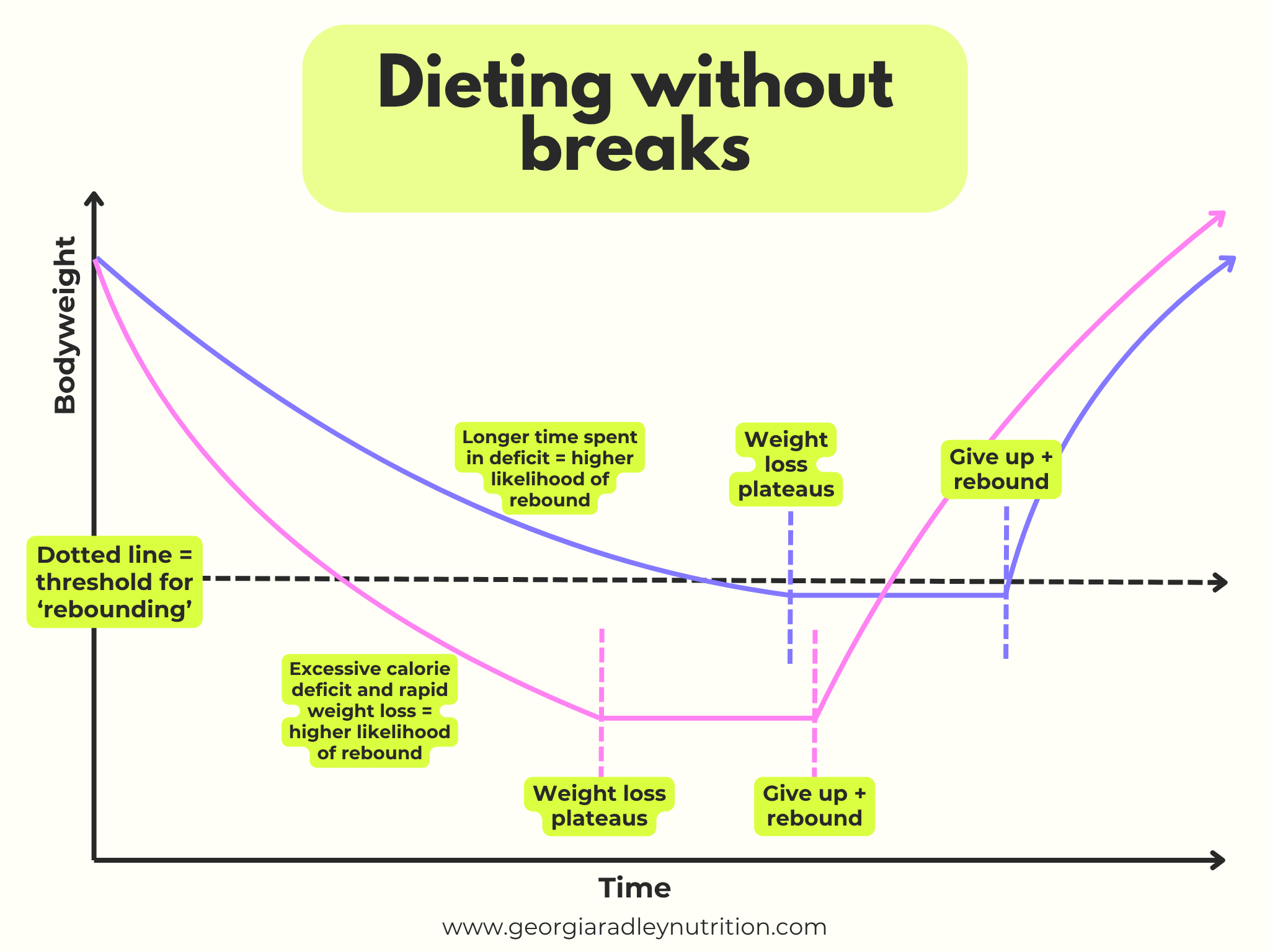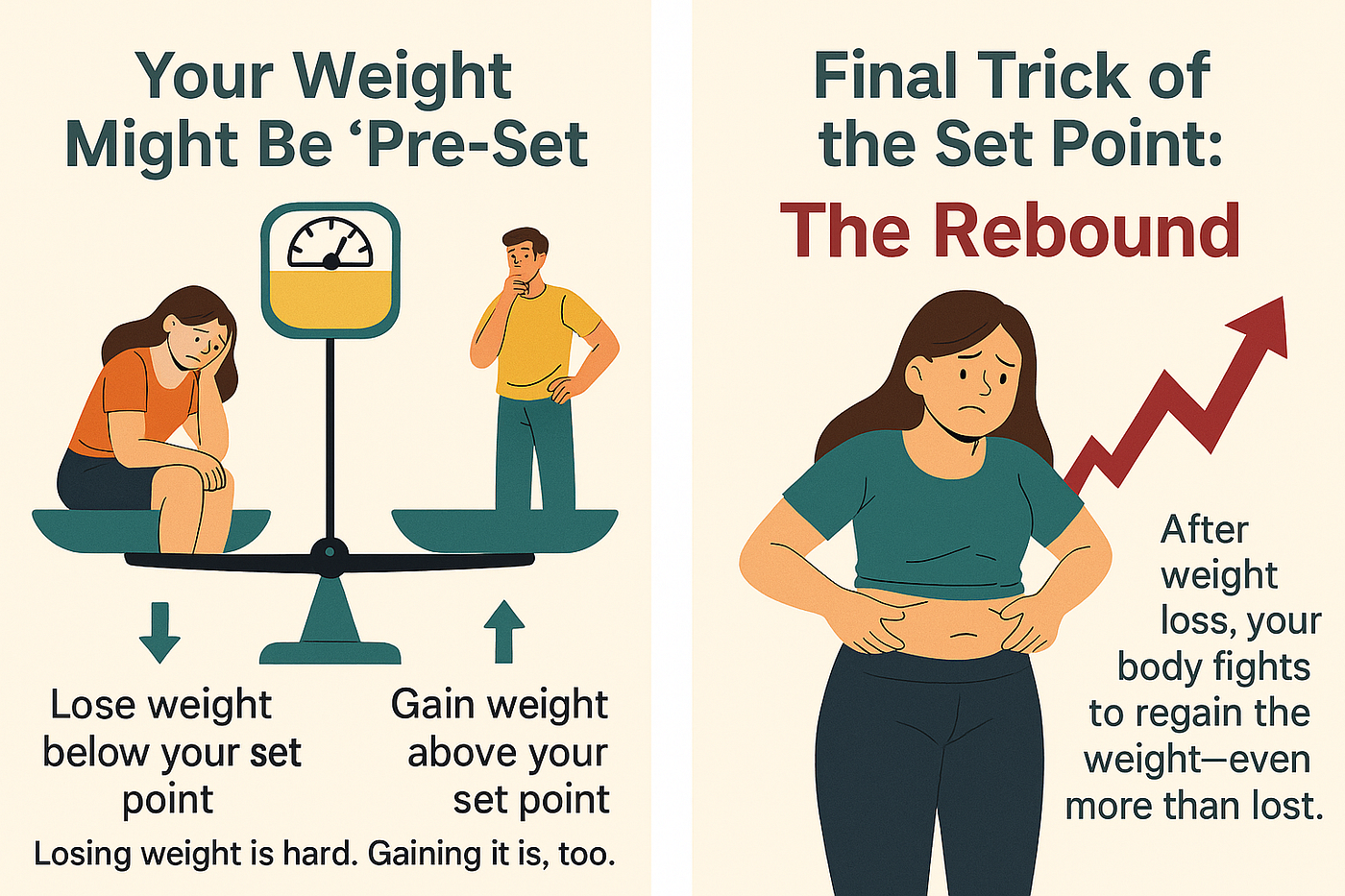Have you ever worked hard to lose weight, only to find those pounds creeping back again? It’s frustrating and confusing, isn’t it?
You follow every rule, eat right, exercise, and still, the scale doesn’t stay in your favor. But why does this happen to so many people, including you? Understanding the real reasons behind weight regain can change everything. Keep reading, because uncovering these secrets will help you break the cycle for good and keep your weight off for the long term.
Common Causes Of Weight Regain
Losing weight can be hard, but keeping it off is often even harder. Many people find that their weight goes back up after dieting.
This happens for many reasons. Understanding these reasons can help you manage your weight better over time.
Metabolic Adaptations
When you diet, your body slows down its metabolism. It burns fewer calories to save energy.
This makes it easier to gain weight again because your body needs fewer calories than before.
Loss Of Muscle Mass
Dieting can cause you to lose muscle along with fat. Muscle burns more calories than fat.
Less muscle means your body uses fewer calories, which can lead to weight gain after dieting.
Hormonal Changes
Dieting affects hormones that control hunger and fullness. Some hormones increase hunger after dieting.
These changes make you feel hungrier and can cause you to eat more and regain weight.
Psychological Factors
Dieting can be stressful and hard to follow for a long time. This stress can lead to emotional eating.
Sometimes people return to old eating habits after dieting, which causes weight to come back.
Unrealistic Diet Expectations
Many diets promise quick and big results. These are hard to keep up for long periods.
When results slow down, people may stop dieting and regain weight because the plan was not realistic.

Impact Of Extreme Dieting
Extreme dieting means cutting calories too much or too fast. Many people try this to lose weight quickly.
This can cause problems that make weight come back after dieting. Understanding these effects helps explain why.
Crash Diet Effects
Crash diets lower calories sharply. The body feels starved and reacts by holding onto fat.
People lose weight fast, but mostly water and muscle, not fat. This makes the weight easy to regain.
- Rapid weight loss is often temporary
- Muscle loss reduces strength and fitness
- Body stores fat to protect against starvation
Nutrient Deficiencies
Extreme diets often lack important vitamins and minerals. This can harm your body and mood.
Without enough nutrients, energy drops and cravings increase. This leads to eating more and gaining weight back.
- Low iron can cause tiredness
- Not enough calcium weakens bones
- Vitamin shortages affect brain and body functions
Slowed Metabolism
When you eat very little, your metabolism slows down. The body burns fewer calories to save energy.
A slower metabolism means you gain weight more easily after dieting. Your body becomes more efficient at storing fat.
- Reduced calorie burn at rest
- Lower muscle mass decreases metabolism
- Body adapts to conserve energy
Role Of Lifestyle Habits
Losing weight is not just about dieting. Lifestyle habits play a big role in keeping weight off. Some habits help maintain weight loss, while others cause weight gain.
Understanding how daily habits affect your body can explain why weight returns after dieting. Making small changes can support long-term weight control.
Physical Activity Levels
Physical activity helps burn calories and maintain muscle mass. After dieting, activity levels often drop, which slows metabolism. This can lead to weight gain.
Regular exercise supports steady energy use and prevents fat storage. Staying active is key to keeping weight off after diet plans end.
- Walking or biking daily
- Strength training twice a week
- Stretching and flexibility exercises
Sleep Quality
Good sleep helps balance hunger hormones. Poor sleep makes you feel hungrier and crave unhealthy foods. This causes extra calorie intake and weight gain.
Getting enough rest improves energy for daily activities. It also helps your body recover from stress and exercise.
- Aim for 7 to 9 hours each night
- Keep a regular sleep schedule
- Limit screen time before bed
Stress Management
Stress causes the body to release hormones that increase fat storage. It also leads to emotional eating and poor food choices. Managing stress helps control weight.
Finding ways to relax reduces the urge to eat for comfort. This supports stable weight after dieting.
- Practice deep breathing or meditation
- Take breaks during busy days
- Engage in hobbies you enjoy
Eating Patterns
Skipping meals or eating irregularly confuses the body. This can slow metabolism and increase fat storage. Balanced eating patterns support healthy weight maintenance.
Eating regular meals and snacks helps control hunger and prevents overeating. This keeps your energy steady and your weight stable.
- Eat three balanced meals daily
- Include healthy snacks if needed
- Avoid large gaps between meals

Strategies For Sustainable Weight Loss
Losing weight can be hard, and many people regain it after dieting. This happens when changes are not lasting. To keep weight off, you need smart strategies that you can follow daily.
These strategies focus on healthy habits that support your body and mind. They help you stay strong and avoid quick fixes that fail.
Balanced Nutrition
Eating balanced meals gives your body the nutrients it needs. Avoid cutting out entire food groups. Instead, include a mix of proteins, carbs, and fats in your diet.
Choose whole foods like fruits, vegetables, whole grains, and lean meats. These foods keep you full and provide energy for your daily activities.
- Eat plenty of vegetables and fruits
- Choose whole grains over refined ones
- Include lean proteins like chicken and beans
- Use healthy fats like olive oil and nuts
Regular Exercise
Exercise helps burn calories and build muscle. Aim for at least 30 minutes of moderate activity most days. This keeps your body strong and boosts metabolism.
Find activities you enjoy, like walking, biking, or dancing. This makes it easier to stay active for a long time.
- Try walking or jogging
- Use home workouts or fitness videos
- Join sports or group classes
- Include strength training twice a week
Mindful Eating
Mindful eating means paying attention to hunger and fullness signals. Eat slowly and enjoy each bite. This helps prevent overeating and improves digestion.
Avoid distractions like phones or TV while eating. Focus on your food and how it tastes. This practice supports better food choices and weight control.
- Eat without distractions
- Chew food slowly
- Notice hunger and fullness levels
- Choose foods that satisfy you
Setting Realistic Goals
Set clear and achievable goals for weight loss. Small steps are easier to keep up than big changes. Realistic goals help you stay motivated and avoid frustration.
Track your progress and adjust your goals as needed. Celebrate your successes to keep going strong.
- Set specific and simple goals
- Focus on habits, not just numbers
- Break goals into small steps
- Review and change goals over time
Maintaining Motivation Long-term
Many people regain weight after dieting because they lose motivation. Staying motivated over time helps keep weight off. It takes planning and good habits.
Long-term motivation means focusing on small changes and tracking progress. You also need support and ways to celebrate success.
Tracking Progress
Tracking your progress helps you see how far you have come. It keeps you focused on your goals. Use simple tools like a journal or an app.
Write down your weight, meals, or exercise each day. This shows patterns and keeps you honest with yourself.
- Record daily or weekly weight
- Note what you eat and how much
- Track workouts and activity levels
Building Support Systems
Support from friends, family, or groups helps keep motivation strong. They can encourage you and hold you accountable.
Talk about your goals and ask for help when needed. Join a community with similar goals for extra support.
- Share your goals with close friends
- Find a workout or diet buddy
- Join online or local support groups
Celebrating Small Wins
Recognize and celebrate small successes along the way. This boosts confidence and keeps you motivated.
Set mini goals and reward yourself without food. This creates positive feelings about your progress.
- Celebrate a week of healthy eating
- Reward yourself with a new book or outfit
- Enjoy a relaxing day after meeting goals

When To Seek Professional Help
Regaining weight after dieting can be frustrating. Sometimes, you need extra help to understand why this happens.
Professionals can guide you to find the right solutions. Knowing when to ask for help is important for your health.
Identifying Medical Issues
Some medical problems cause weight gain or make it hard to lose weight. Conditions like thyroid problems or hormonal imbalances affect your metabolism.
If you keep gaining weight despite dieting, see a doctor. They can check for health issues that may need treatment.
- Thyroid disorders
- Diabetes
- Hormone imbalances
- Medications that cause weight gain
Working With Dietitians
Dietitians help create eating plans that fit your body and lifestyle. They understand how to balance food and nutrients for lasting results.
They can also spot problems in your diet that may cause weight gain after dieting. Getting their advice can improve your success.
- Personalized meal plans
- Guidance on portion sizes
- Support to change eating habits
- Help with nutrient deficiencies
Behavioral Therapy Options
Behavior affects how you eat and exercise. Behavioral therapy helps change habits that lead to weight gain.
Therapists teach skills to manage stress, emotional eating, and motivation. This support can keep your weight stable after dieting.
- Stress management techniques
- Mindful eating practices
- Goal setting and motivation
- Addressing emotional triggers
Frequently Asked Questions
Why Do People Regain Weight After Dieting?
People often regain weight due to metabolic slowdown and loss of muscle mass. Diets can reduce calorie intake drastically, leading to temporary weight loss. Once normal eating resumes, the body stores extra calories as fat, causing weight regain.
How Does Metabolism Affect Weight Regain?
A slower metabolism burns fewer calories, making it easier to regain weight. Dieting can lower metabolic rate by reducing muscle mass and energy expenditure. Maintaining muscle and gradual calorie increases help prevent metabolic slowdown.
Can Dieting Cause Muscle Loss And Weight Gain?
Yes, strict dieting without strength training can cause muscle loss. Muscle loss decreases metabolism, making weight regain more likely. Including protein and resistance exercises preserves muscle during weight loss.
How Important Is Sustainable Dieting For Long-term Weight Loss?
Sustainable dieting supports steady weight loss and prevents regain. Extreme diets are hard to maintain and often lead to binge eating. Balanced, flexible eating habits promote lasting results and better health.
Conclusion
Regaining weight after dieting can feel frustrating. Remember, it’s a common experience. Diets can often be too restrictive, leading to temporary results. Focus on creating sustainable habits. Eat balanced meals and avoid skipping meals. Regular exercise helps maintain weight. Stay patient and consistent with your efforts.
Small changes lead to lasting results. Celebrate progress, even if it’s slow. Listen to your body’s needs. Seek support from friends or professionals. They can provide guidance and motivation. Developing a healthy lifestyle takes time. Be kind to yourself during the journey.
Keep going. You’re not alone in this.



